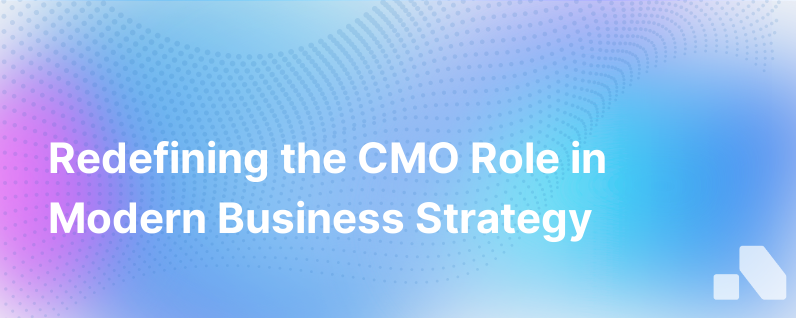
The role of the Chief Marketing Officer (CMO) has traditionally been associated with branding, advertising, and market research. Over the years, this role has slowly evolved to encompass broader responsibilities such as customer experience and data analytics. However, the modern business landscape demands a further redefinition of the CMO’s role to adapt to new challenges and leverage emergent opportunities. It is no longer sufficient for CMOs to be mere brand custodians; they must now be visionary leaders that drive growth, foster innovation, and embody the customer journey from start to finish.
Let's take a deep dive into why and how the role of the CMO needs to be redefined, transforming it from a position of creative storyboard leadership into one of measurable strategic significance.
Changing Customer Journey
In today’s fast-paced digital environment, the customer journey has become non-linear and highly personalized. The proliferation of touchpoints from social media to mobile apps necessitates a CMO's involvement in creating a seamless and consistent omnichannel experience.
CMOs must possess a keen understanding of the customer’s end-to-end journey and ensure each interaction delivers value and reinforces the brand promise. This requires not only creative prowess but also strategic insights into customer behavior and preferences collected through sophisticated data analytics.
Data-Driven Decision Making
The role of the CMO has become increasingly data-centric. A modern CMO is expected to have a strong grasp of big data, machine learning, and artificial intelligence tools to inform marketing strategies.
Analytics are critical for understanding market trends, customer segments, and campaign performance. CMOs must learn to harness the power of data to derive actionable insights, enabling them to pivot quickly, personalize marketing efforts at scale, and measure the ROI of their initiatives with higher accuracy.
Technology and Digital Savvy
The digital revolution has transformed marketing into a technology-driven field. A contemporary CMO needs to be as comfortable with the latest martech stack as they are with traditional marketing concepts. This means not only leveraging these technologies for enhanced customer experiences but also being able to work closely with Chief Information Officers (CIOs) and IT teams to ensure a fluid integration of tech and marketing.
Content as a Strategic Asset
Content marketing has grown to be a core facet of modern inbound marketing strategies. Today’s CMOs need to view content not just as a tool for engagement but as a strategic asset that can drive lead generation, sales, and customer retention. This requires a comprehensive content strategy that aligns with the user’s needs and journey while delivering on key business objectives.
Growth and Revenue Generation
The redefined CMO role is intrinsically tied to overall business growth and revenue. This means taking ownership of the marketing funnel end-to-end and ensuring marketing strategies seamlessly translate into sales. CMOs should be working hand-in-hand with Chief Revenue Officers (CROs) or sales departments to ensure the marketing and sales alignment is tight and collaborative.
Customer Advocacy
Brands are now expected to resonate with customers on a deeper, more personal level. This means the CMO must be a genuine advocate for customers within the organization, ensuring that the voice of the customer informs product development, customer service, and all aspects of the business.
Influencing Company Culture
Marketing's scope is no longer limited to external messaging; it also plays a pivotal role in shaping and communicating the company's internal culture. As culture bearers, CMOs should influence and nurture the organization's values, ensuring that the brand's internal embodiment is consistent with its external perception.
Sustainability and Purpose-Driven Marketing
As consumers increasingly prefer brands with a purpose, CMOs have a crucial role in defining and communicating the company’s sustainability and social responsibility initiatives. They need to weave the brand’s commitment to social issues into the storytelling fabric without appearing opportunistic, ensuring authenticity and trustworthiness in the eyes of the consumer.
New Skills and Competencies
To fulfill these widened responsibilities, CMOs must continuously upskill and reskill. Knowledge in areas such as customer experience mapping, agile methodologies, and strategic foresight are becoming increasingly important. Additionally, leadership and the ability to drive organizational change are imperative for CMOs to succeed in their newly defined role.
Collaboration Across the C-Suite
Finally, the CMO’s new role involves fostering collaboration across the C-suite. In a business environment that increasingly values interconnectivity, CMOs need to work alongside their counterparts in finance, IT, operations, and HR to drive growth and innovation. Creating a united front in the C-suite ensures that marketing strategies are deeply embedded in the company's operational DNA and geared toward long-term success.
Conclusion
In an era marked by digital disruption, heightened competition, and evolving consumer expectations, the traditional definition of the CMO role is no longer relevant. CMOs must transition from brand ambassadors and art directors to strategic, tech-savvy, data-oriented leaders with a finger on the pulse of the customer experience.
The redefinition of the CMO role is not merely an adaptation to change; it's an acknowledgment of the strategic importance of marketing in today’s business world. It’s time for CMOs to step up and embrace their new mandate as drivers of growth, innovation, and customer-centricity.
As organizations seek to redefine their approach and elevate their CMOs, platforms like Aomni can provide the necessary tools and insights to empower this strategic transition, ensuring that the marketing function is directly aligned with achieving key business outcomes.